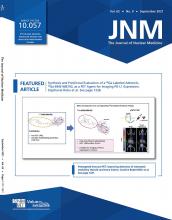REPLY: Dr. Wee and colleagues reviewed their database of gastroenteropancreatic neuroendocrine tumor patients treated with 177Lu-DOTATATE and observed patterns of bowel obstruction very similar to those described in our study (1). These corroborating data significantly strengthen the evidence of a causal link between 177Lu-DOTATATE and risk of intestinal obstruction among patients with mesenteric or peritoneal disease. Fortunately, the increased use of high-sensitivity somatostatin receptor PET imaging (e.g., 68Ga-DOTATATE and 64Cu-DOTATATE PET) improves the ability of clinicians to identify peritoneal carcinomatosis and screen patients who are at risk for bowel obstruction.
What can be done to mitigate this complication? We have adopted a strategy of classifying mesenteric or peritoneal disease patterns as high or intermediate risk for intestinal obstruction. We define high risk as extensive peritoneal implants, omental caking, or mesenteric masses with significant bowel tethering causing symptoms of intermittent partial bowel obstruction. Intermediate risk is defined as scattered peritoneal or mesenteric metastases (greater than 10 but not innumerable), mesenteric mass with minimal bowel tethering, or implants in the rectovesical or rectouterine pouch.
Patients at high risk of obstruction are advised to pursue other second-line options such as everolimus, cytotoxic drugs, or (in select cases) debulking peritoneal or mesenteric surgery. We prophylactically treat intermediate-risk patients with corticosteroids after each cycle of 177Lu-DOTATATE based on the presumption that radiation-induced inflammation contributes to the obstructive process. The regimen we use generally consists of 8 mg of intravenous dexamethasone after completion of amino acid infusion followed the next day by a 3-wk oral dexamethasone taper starting at 4 mg by mouth daily. We acknowledge that evidence for the prophylactic use of corticosteroids remains theoretic, and that other regimens (such as solumedrol dose pack) may be equally effective or ineffective.
We have not observed any episodes of irreversible bowel obstruction occurring after 177Lu-DOTATATE since adopting these mitigation strategies. Hopefully, our real-world experience, combined with that of the Mayo Clinic, will help ensure that clinicians are cognizant of this potential complication and will stimulate further research into prevention strategies.
Footnotes
Published online July 8, 2021.
- © 2021 by the Society of Nuclear Medicine and Molecular Imaging.
REFERENCE
- 1.↵







